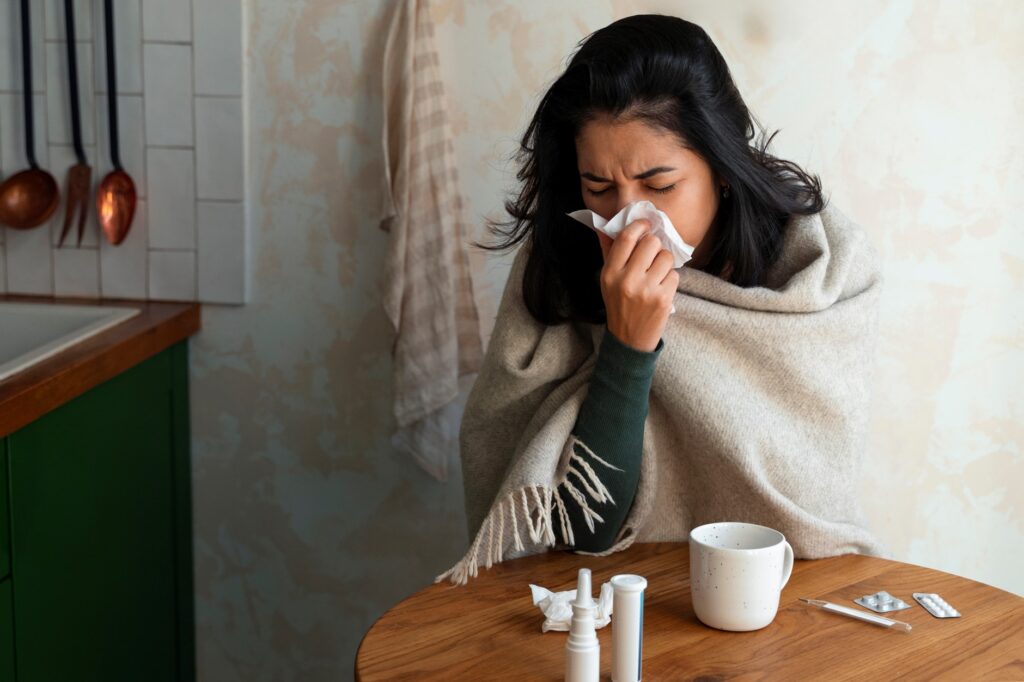What is Typhoid?
Typhoid is a serious illness caused by the bacteria Salmonella Typhi. It spreads through contaminated food or water. Typhoid fever is common in areas with poor sanitation. Many people in Asia, Africa, and Latin America are at higher risk. However, anyone can get typhoid if they are exposed to the bacteria. Early treatment is important to prevent complications.
Symptoms of Typhoid
Typhoid symptoms usually appear one to three weeks after exposure. Sometimes, symptoms are mild at first. But they can become severe if not treated. Common signs include:High fever that lasts for daysWeakness and fatigueStomach pain or discomfortHeadacheLoss of appetiteDiarrhea or constipationDry coughRash with flat, rose-colored spots (in some cases)
Additionally, some people may feel confused or very tired. If you notice these typhoid symptoms, seek medical help right away.
Causes and Transmission
Typhoid fever is caused by swallowing Salmonella Typhi bacteria. These germs live in the intestines and blood of infected people. The main ways typhoid spreads are:Drinking water contaminated with sewageEating food handled by someone with typhoidPoor handwashing after using the toilet
For example, in crowded cities with unsafe water, typhoid is more common. Travelers to these areas should be extra careful. Good hygiene can help stop the spread.
Diagnosis of Typhoid
Doctors diagnose typhoid by checking your symptoms and medical history. However, they often need lab tests to confirm the infection. Common tests include:Blood tests to find the bacteriaStool or urine testsBone marrow tests (rarely needed)
Early diagnosis helps start treatment quickly. This lowers the risk of serious problems.
Treatment Options
Typhoid treatment usually involves antibiotics. These medicines kill the bacteria and help you recover faster. Doctors may also recommend:Drinking plenty of fluids to prevent dehydrationResting as much as possibleEating light, easy-to-digest foods
Sometimes, people need to stay in the hospital. This is more likely if symptoms are severe or if there are complications. Do not stop antibiotics early, even if you feel better. Otherwise, the infection may return.
Prevention Tips
Preventing typhoid is possible with simple steps. For instance, you can:Wash hands often with soap and waterDrink only boiled or bottled waterAvoid raw fruits and vegetables unless you peel them yourselfEat food that is cooked and served hotGet vaccinated before traveling to high-risk areas
Moreover, teaching children about handwashing helps protect families. The World Health Organization and CDC recommend these steps for typhoid prevention.
Lifestyle and Home Care Guidance
While recovering from typhoid, home care is important. For example, you should:Take all medicines as prescribedRest until your doctor says you can return to normal activitiesDrink fluids like water, clear soups, and oral rehydration solutionsEat small, frequent mealsKeep your living area clean to prevent spreading the bacteria
Additionally, avoid preparing food for others until your doctor confirms you are no longer infectious. This helps protect your loved ones.
In summary, typhoid is a serious but treatable illness. Early diagnosis and proper care are key. Consult us at Vedh Multispecialty Hospital for personalized advice on Typhoid.

